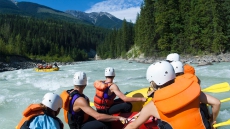VANCOUVER — Strategic fishery closures and marine habitat protection are part of a proposed plan by the federal government to protect the threatened killer whales off Canada's West Coast.
The recovery plan for the Northern and Southern Resident Killer Whale population has been set out online by the Department of Fisheries and Oceans with a 60-day public comment period.
The document makes 94 recommendations to help the two distinct whale populations that eat only fish.
The Northern Residents are listed as threatened in Canada, while the United States has declared its Southern Resident population endangered.
The whales are considered at risk because of their small population, low reproductive rate and numerous human-caused threats that could prevent recovery or cause further declines, says the report.
"Even under the most optimistic scenario ... the species' low intrinsic growth rate means that the time frame for recovery will be more than one generation."
A team of experts from the federal Fisheries Department, Parks Canada, the Vancouver Aquarium and the National Oceanographic and Atmospheric Administration in the United States developed the plan between 2011 and 2014.
Its members found that key threats to recovery include reductions in the availability and quality of prey, or salmon, environmental contamination and physical and acoustic disturbances.
Every year there is tussle over the division of the West Coast salmon fishery between First Nation, commercial and recreational fishermen, and up until this report, killer whales haven't been factored into the equation.
The population of Southern Killer Whales declined three per cent a year from 1995 to 2001, and has shown little recovery since then, the plan says. Just 77 southern whales were counted in 2014.
The Northern Killer Whales population plummeted at a rate of seven per cent each year between 1997 and 2001. But it grew from 219 whales in 2004 to upward of 280 whales in 2014.
The proposed recovery plan recommends the Department of Fisheries undertake several measures that would ensure whales have a large enough food supply to promote recovery.
It says chinook and chum salmon appear to be the whales' main prey during the summer and fall, but little is known about their diet during the other seasons.
"The lack of information about winter diet and distribution ... is a major knowledge gap that impedes our understanding of the principal threats facing the population," says the proposed plan.
One specific recommendation, marked as a high priority for the next five years, urges the department to "investigate strategic fishery closures as a possible tool" to reduce the whales' prey competition in specific feeding areas.
It also recommends the department investigate implementing "protected areas and fishery closures as tools to protect important foraging and beach-rubbing locations." The Robson Bight Ecological Reserve is a well-known spot where the whales rub their bodies on the rocky shore, but such behaviour has been recorded at several other beaches on Vancouver Island.
The proposals also suggest more general measures to protect whale prey from "exploitation and degradation," including preserving the freshwater habitat where those fish live. It urges the continued support of wild salmon policy and salmon recovery plans.
Other broad objectives include ensuring that human activities and chemical and biological pollutants don't prevent the recovery of whale populations.
Some high-priority measures to meet those goals include monitoring the long-term threats of climate change and El Nino, and working with National Defence to reduce whales' exposure to "high intensity underwater sound from military operations."
The plan says its recommendations are "highly likely to benefit" the other two types of whales that live in Canadian Pacific waters, the transient or Bigg's and Offshore Killer Whales.





